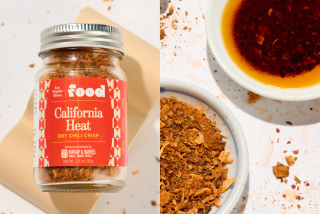MARINADES
- Share via
Just about every reference you check defines a marinade as a liquid, often containing an acidic ingredient, in which food is soaked to impart flavor or to tenderize. The trouble with such definitions is that they tell only part of the story and perhaps leave room for misinterpretation.
A blanket statement that marinades tenderize meat is apt to be misleading. “It’s a fine line. Marinades can help with less tender cuts, if they aren’t too thick,” says Marlys Bielunski, director of Test Kitchens and Editorial Services for the National Live Stock and Meat Board. But the penetration of this tenderizing effect of marinades is usually limited to about one-quarter-inch deep from the cut surface of the meat, so a marinade won’t work miracles on less tender thick cuts of meat.
To clarify this point, Bielunski explained that if a 3/4- to 1-inch-thick chuck steak is marinated, inch on each side will be affected. Grilled medium-rare and sliced thinly across the grain, it will be more tender than the same cut that is simply grilled. However, she adds that other factors--the concentration, amount of marinade and length of time it’s in contact with the meat--also affect results. The board recommends using about half a cup marinade for each pound of meat and placing both in a securely closed plastic bag or covered glass, stainless steel or enamel dish just large enough to hold them.
Except for very short periods, foods being marinated should be kept in the refrigerator. If marinated several hours or overnight, the bag or meat needs be turned several times to ensure equal exposure to the marinade.
Another fallacy of most definitions is classifying all marinades as liquids. To be more accurate, dry rubs--mixtures of spices that are rubbed into the surface of meats--are also categorized as marinades.
Although a wide variety of ingredients may be combined, Phillip Stephen Schulz in his book “Cooking with Fire & Smoke” (Simon & Schuster) advises against using salt in dry rubs, “as it has a tendency to draw out meat’s juices.” However, another opinion is expressed in “Grilling & Barbecuing” (HP Books), when authors John Phillip Carroll and Charlotte Walker say: “Salt in the dry rub combines with meat juices to create a brine that penetrates and flavors the meat. Even when only marinated 15 to 30 minutes in a salty dry rub, beef flavor improves greatly.”
Liquid marinades may be either cooked or uncooked. According to the general guidelines for marinating from the National Live Stock and Meat Board, cooked marinades add the most flavor to meat and are preferred for marinating periods that exceed 12 hours. These should be cooked in advance and chilled before being combined with the food.
We expand to use the term food because many kinds other than meat benefit from being marinated. Certainly poultry and vegetables, but also fish and seafood can be enhanced in flavor when marinated a short time. The term macerate is used when fruit is treated with this process because over time the fruit tends to soften and even break down more visibly than meats.
How long should something be marinated? If the object is simply to impart flavor, an hour or two may be all that’s necessary. In the case of meats, where the tenderizing effect (even if limited) is desired, marinating eight hours or overnight is fairly standard. Too long a period, however, can cause food to lose texture and have its own natural flavor overpowered.
In addition to preparing marinades from recipes, quite an array of bottled marinades can be found on supermarket shelves for those who prefer this convenience. However, with the exception of Cooked Marinade, the following recipes require limited preparation time.
Hotness of the Spicy Marinade for Shrimp depends on the amount of red chili paste used. A teaspoon will probably suit most tastes, but adjust to your liking. Chili paste is available in the Oriental section of many supermarkets and at Oriental groceries.
The Beer Marinade recipe was tested with beef, but would be an equally good choice for shrimp. Rabbit used to test the Cooked Marinade was judged outstanding by our taste panel. The dry rub is an adaptation of one used at Alexander’s Choice Meats in Sierra Madre, and is especially good on pork.
Walnut oil is the key to the Marinated Roasted Peppers recipe. Other oils will not give the mellow, nutty flavor. Spiced Plums and the two recipes for marinated mixed fruit make excellent accompaniments to meats or dessert sauces. The color of both mixed fruit marinades starts out clear, but is influenced during the marinating period by the fruits used as their juices are extracted.
Food styling by MINNIE BERNARDINO and DONNA DEANE / Los Angeles Times
SPICY MARINADE FOR SHRIMP
1 cup rice wine vinegar
1/4 cup lime juice
1/2 cup olive oil
2 tablespoons chopped cilantro
2 cloves garlic, minced
1 teaspoon sesame oil
Salt
1 teaspoon red chili paste, about
24 large shrimp
Combine vinegar, lime juice, olive oil, cilantro, garlic, sesame oil and salt to taste. Add 1 teaspoon chili paste or more to taste. Shell and devein shrimp. Place in marinade, turning to coat all sides. Marinate 30 minutes.
Thread 3 shrimp onto each of 8 bamboo skewers that have been soaked in water. Grill 2 to 3 minutes per side. Makes 4 servings, 6 shrimp each.
BEER MARINADE
1 (12-ounce) bottle or can beer
1/2 cup oil
1 small onion, coarsely chopped
2 large cloves garlic, minced
1/4 cup cider vinegar
Juice of 1 lemon
1 teaspoon dry mustard
Dash hot pepper sauce
1 tablespoon chopped parsley
Salt, pepper
Combine beer, oil, onion, garlic, vinegar, lemon juice, dry mustard, hot pepper sauce and parsley. Season to taste with salt and pepper. Makes 2 3/4 cups.
Note: Use for beef or shrimp.
COOKED MARINADE
1 medium onion, thinly sliced
1 stalk celery, thinly sliced
1 carrot, thinly sliced
2 cloves garlic, crushed
1/4 cup olive oil
3 cups dry red wine
1 cup water
1 teaspoon Worcestershire sauce
1/2 teaspoon marjoram
1/2 teaspoon thyme
1 bay leaf
1 tablespoon black peppercorns
1 teaspoon whole cloves
1 tablespoon juniper berries, crushed
Saute onion, celery, carrot and garlic in olive oil about 5 minutes. Add wine, water, Worcestershire, marjoram, thyme, bay leaf, peppercorns, cloves and juniper berries. Simmer, covered, over low heat 1 hour. Strain. Cool before using. Makes about 2 cups.
Note: Use for meat or game.
DRY RUB
1 teaspoon paprika
1/4 teaspoon garlic powder
1/4 teaspoon onion powder
1 teaspoon salt
1 teaspoon celery salt
1/8 teaspoon black pepper
1/4 teaspoon parsley flakes
1/4 teaspoon oregano, crushed
1/8 teaspoon ground rosemary
Combine paprika, garlic powder, onion powder, salt, celery salt, pepper, parsley, oregano and rosemary. Makes about 1 1/2 tablespoons.
Note: This makes enough dry rub for 5-pound pork roast. Rub over entire surface of meat and refrigerate overnight before roasting.
MARINATED ROASTED PEPPERS
2 green peppers
2 sweet red peppers
2 yellow peppers
1/4 cup walnut oil
1/4 cup safflower oil
1/4 cup white wine vinegar
2 tablespoons chopped oregano
1 teaspoon sugar
Salt, pepper
Place green, sweet red and yellow peppers in shallow baking pan. Roast, uncovered, at 400 degrees 25 to 30 minutes or until skin is browned and looks blistered. Remove from oven and place in plastic bag. Close tightly and let stand at room temperature 30 minutes.
Remove skin, stems and seeds from peppers. Cut into 1-inch-wide strips.
Combine walnut oil, safflower oil, vinegar, oregano and sugar in plastic bag. Add pepper strips. Season to taste with salt and pepper. Close bag and marinate several hours or overnight. Makes 6 to 8 servings.
SPICED PLUMS
1/2 cup vinegar
2 cups sugar
1 cup honey
1 cup water
1 tablespoon whole cloves
2 sticks cinnamon
2 pounds plums
Combine vinegar, sugar, honey and water. Bring to boil, then boil 10 minutes. Meanwhile, tie cloves and cinnamon sticks in cheesecloth. Cut plums in halves and remove pits.
Add spices and plums to syrup, then reduce heat and simmer 5 to 10 minutes, until fruit is soft but does not lose shape. Chill several hours or overnight.
Remove spice bag and plum skins. Store plums and syrup in covered container in refrigerator up to 1 week. Makes 3 1/4 cups.
Note: Serve as accompaniment to meats or as dessert sauce.
LIQUEUR MARINADE FOR MIXED FRUIT
2 cups sugar
1 cup water
1 stick cinnamon
1 teaspoon whole allspice
1 cup orange liqueur
6 plums, quartered
2 nectarines, peeled and sliced
1/2 cup blueberries
Combine sugar and water in saucepan. Tie cinnamon and allspice in small square cheesecloth and add to pan. Bring mixture to boil and boil hard 5 minutes. Remove from heat and stir in liqueur.
Place plums, nectarines and blueberries in clean 1-quart glass jar. Pour hot syrup over. Cover and marinate at least 24 hours. Makes about 4 cups, 8 servings.
Note: Any mixture of fruit may be used in the recipe.
WINE MARINADE FOR MIXED FRUIT
2 cups sugar
1 cup water
1/2 teaspoon anise seeds, crushed
1 cup bianco
6 plums, quartered
2 pears, peeled and sliced
1/2 cup blueberries
Combine sugar, water and anise seeds in saucepan. Bring to boil and boil hard 5 minutes. Remove from heat and stir in wine.
Place plums, pears and blueberries in clean 1-quart glass jar. Pour hot syrup over. Cover and marinate at least 24 hours. Makes about 4 cups, 8 servings.
Note: Bianco is Italian white vermouth. Any mixture of fruit may be used in the recipe.
More to Read
Eat your way across L.A.
Get our weekly Tasting Notes newsletter for reviews, news and more.
You may occasionally receive promotional content from the Los Angeles Times.








